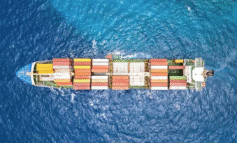The introduction of ever-larger containerships is a much-discussed topic in academic and business circles. The largest containership size has evolved from about 5,500 TEU in 1995 to more than 23,000 TEU in 2019. The economic rationale for further scale increases in ship size is largely dependent on the current and future market conditions in the container shipping market, the adaptive capacity of ports and terminals (both economically and technologically) and, as of late, environmental requirements and considerations.
The latest paper of PortEconomics member Theo Notteboom along with Jiawei Ge (Shanghai Maritime University and University of Tasmania), Mo Zhu (Shanghai Maritime University), Mei Sha (Shanghai Maritime University), Wenming Shi (University of Tasmania) and Xuefeng Wang (Shanghai Maritime University) evaluates under which economic, operational and environmental conditions and expectations, shipping companies are likely to push the ultra large containership (ULCS) size from 18,000-20,000 TEU to 25,000 TEU. Differences in both annual container slot cost and more comprehensive cost-benefit measures are assessed under different key market-based and operational conditions. The basic cost parameters for 20,000 TEU and 25,000 TEU vessels were estimated using a regression analysis applied to actual data of vessels up to 18,000 TEU. Our findings show that a further scale increase to a 25,000 TEU ULCS still generates economies of scale. However, very low freight rates, i.e. even below the poor freight rates of 2016-2017, and low load factors would not be conducive to the economic viability of 25,000 TEU ships, compared to smaller ULCSs.
This study- published in the Maritime Economics and Logistics- complements and updates the findings of previous studies (which focused on much smaller ship sizes) and contributes to the ongoing academic and corporate discussion on drivers and impediments of scale increases in vessel size by explicitly incorporating time- and context-dependent factors affecting optimal ship size.
Log in and download the authors version of the most interesting port study.












